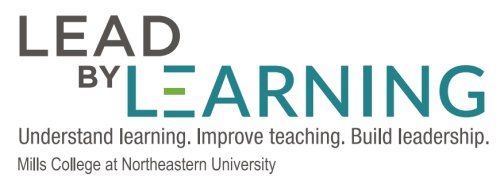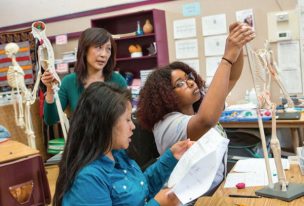Routine Data Collection Helps a First Year Teacher Uncover the Layers of Successful Group Work
 Like most first year teachers, 7th grade math and science teacher Robyn Chevalier-Hall began her year at Oakland’s Melrose Leadership Academy in survival mode. She started the year thinking she might focus her inquiry on efficient routines for homework collection. But as this capable teacher settled in and began to think more closely about teaching and learning in her class of 33 adolescents seated at tables, she decided to hone in on effective group work.
Like most first year teachers, 7th grade math and science teacher Robyn Chevalier-Hall began her year at Oakland’s Melrose Leadership Academy in survival mode. She started the year thinking she might focus her inquiry on efficient routines for homework collection. But as this capable teacher settled in and began to think more closely about teaching and learning in her class of 33 adolescents seated at tables, she decided to hone in on effective group work.
Recently, Robyn reflected:
I did not learn to teach with students, very chatty students, in groups. I did not have any idea how to get them to actually learn when it was so tempting for them to socialize. Plus, I have 33 kids in a very small class, so it naturally gets loud very fast. My work with Mills allowed me to take a situation that was very daunting and focus, first, on what was just happening in groups.
Supported by Mills Teacher Scholars staff and the practical advice of her BTSA mentor, Robyn began to collect audio and video data about what was occurring during group work time. Robyn’s thoughts on being a first year teacher and managing data collection:
Collecting data seemed a bit overwhelming to a first year teacher, so to have someone else do it was encouraging. Once I saw how easy it was to collect the audio data, I was able to do it again on my own at another time. This is so helpful to know what was really happening during group times. It let me think about when kids got off task, how did they complete the work, and was there much dialogue. I realized that I had been trying different protocols during group times, but I had no idea which was the most effective for encouraging dialogue rather than completion of the work.
As she looked and listened to what was happening in the groups she became much more specific about her indicators of success for her students. She did not simply want groups to produce the correct answer, all copying from the one student they considered to be most expert. She wanted students to agree and disagree with each other, ask for clarification of each other’s thinking, and justify their own answers or ideas. Furthermore, she wanted to know which group work protocols and teaching practices facilitated this.
If I was not doing this inquiry I would not test all these protocols if I didn’t have to test them. I would probably have spent the year just getting frustrated that students weren’t “learning” in groups like they are supposed to. I am realizing more and more that students have never learned like this before – it is new to them, so they need to be taught how to do it. My goal now, rather than at the beginning, is not [just] to teach them math, but to teach them how to do group work, so they can construct mathematical understanding together.
As Robyn completes the end of her inquiry year having looked closely at her focal student’s learning in this area, she has a more developed understanding of her middle school students and the sort of scaffolds and routines that facilitate academic discussion for deep conceptual understanding. Taking the “not your typical first year teacher” one step further, Robyn will share the results of her inquiry as part of the Melrose Leadership Academy teacher panel at our Teacher Inquiry in Action Forum on May 21st.

